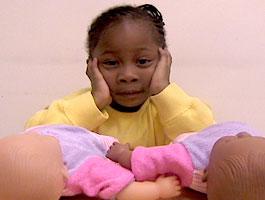Beauty and Black Girls

I was reading a column by Miami Herald columnist Leonard Pitts http://www.miami.com/mld/miamiherald/living/columnists/leonard_pitts/15545216.htm
in which he discussed a short film created by Kiri Davis, a black female student, about the problems young black girls have with skin color. Basically, she and her friends talk about the struggles they have with skin color. The darker skinned girls talk about the standard of beauty is being light-skinned and having straight hair. Ms. Davis also recreates the famous "doll test" performed by Dr Kenneth Clark in the 1930's. This test was where black children were presented with a black doll and a white doll and asked which doll the children preferred. Most black children picked the white doll. This test was used to end school segregation in the Brown vs the Board of Education case in 1954. Ms. Davis performs the "doll test" during the documentary, and sadly 15 out of the 21 kids picked the white doll as the preferred one to play with. A couple of kids were asked why they made their choice, they simply replied that the doll was white. When asked about which doll was "bad", most kids pointed at the black doll.
The film http://www.uthtv.com/umedia/collection/2052/ displays that we as blacks still have a way to go in establishing acceptance and pride in our appearance. Mr Pitts in his column asserts that black culture namely the hip-hop culture is partly responsible for the negative views which blacks have about themselves. I agree with Mr. Pitts (which I usually do not) that the culture has been harmful. If young people only see themselves as criminals, women as sex objects and subject of awful degrading, what will their self-image will be?
The irony of this situation is that unlike the pre-civil rights era, our images are controlled by other black people. There are more blacks on television, in magazines, on fashion runways than any other time in history. If you look at the people, they represent a variety of shades of color. In fact, there are probably more prominent brown and dark skinned blacks than light-skinned blacks in the entertainment industry and mass media. Somehow, there is a disconnect between this progress and how many black girls visualize themselves. That is why this film and results are a bit disturbing to older blacks who remember a different time when dark-skinned blacks were being ostracized openly in society. Many blacks thought this battle was won in the 1970's.
I believe the answer (like many of our problems) lies in the home. While it is true that black comedians make fun of skin colors and African features, the greatest amount of predujices about skin color comes from parents and family members. While the outside world, mass media and the entertainment industry has progressed beyond skin color, a lot of the black community has not. People who have grown up believing that light skin is more beautiful and African features are undesirable, continue to pass these predujices to their children and grandchildren. Some people take out their predujices by labeling light-skinned people "white" and "not really black". Other people try to lighten their skin, add extensions to their hair, and avoid dating,marrying and having children with darker skinned people.
How many times, if you are black, have someone in your family made an offhand remark about someone being dark as "ugly" or someone light skinned as a "fine redbone"? We all know that the views of our family and closest friends can shape our self-image. The biggest step in overcoming this mindset is first awareness of our predujices. We must be careful about spreading our biogtry to our children. We must begin to teach our children that "beauty" comes in all forms, shades and sizes. Churches can help support this by stressing that we all are special because we are made in "God's image". I don't know all of the answers and I would like to invite any feedback from readers. I think that this topic is very important and has a crucial impact of the continued upward progress of Blacks in America.

<< Home